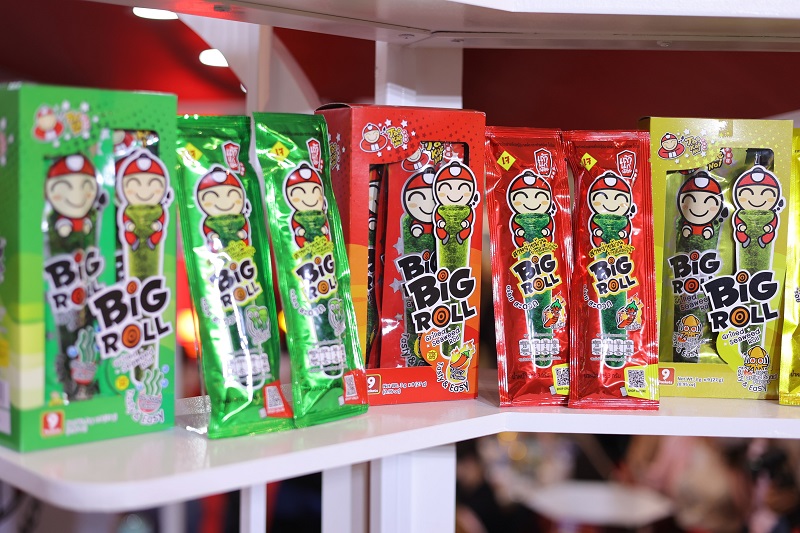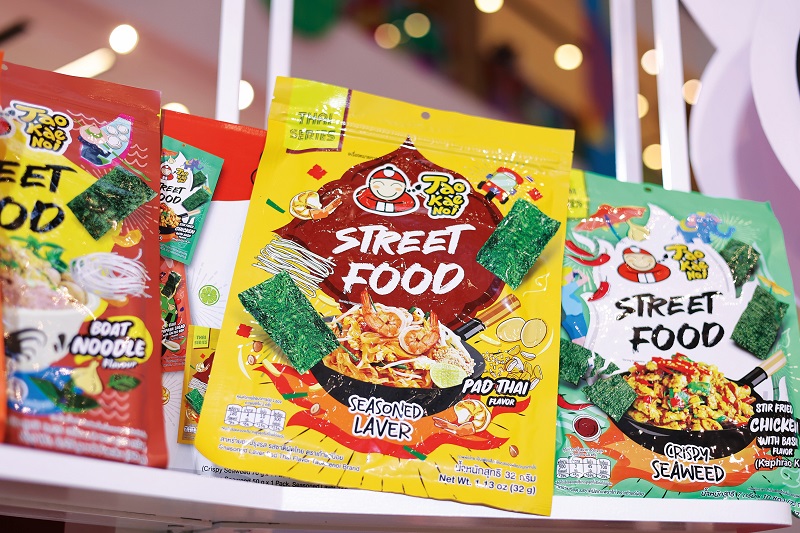
Tob: In the next five to 10 years, this seaweed snack will be well known across the world. (All photos: TaoKaeNoi Food & Marketing)
Talk about an old head on young shoulders: Itthipat “Tob” Peeradechapan, 38, has spent more than half his life building up a family business that in 2018 placed him on Forbes’ Thailand’s 50 Richest list, with a net worth of US$600 million. Have a chat with him and you will find that financial figures take a backseat to what he has learnt along the ride to the top.
Tob is founder and CEO of TaoKaeNoi Food & Marketing (TKN), the manufacturer and distributor of processed seaweed. Circumstances threw him into the business when he was 18. Courage, confidence, acumen and probably street smarts helped him grow it into an enterprise that dominates the Thai domestic market, with operations in Australia, Canada, the US and UK, and plans to penetrate into Europe.
Things were bleak when his wealthy family became bankrupt as a result of the Asian financial crisis. Tob, who had to drop out of college, became a vendor selling roasted chestnuts before switching to seaweed, which he loves eating.
“I wasn’t 100% sure I would make it, but I was confident I would succeed somehow,” Tob, with help from a translator, told Malaysian media in Bangkok for a global fun fair to mark TKN’s 20th anniversary recently.
When he was about 16, Tob did a little game trade that earned him a tidy sum. “My confidence came from there. It’s not that I thought I would be able to cover all my family’s debt. But it’s very important that whatever you do in business or sport, if you’re confident you are going to be successful, you’re halfway there,” he says.
Daring is a force that seems to guide Taokaenoi, or “little boss” in Thai. When Tob told his father he wanted to set up a business, the latter quipped that he would become a taokaenoi. He decided on that name for his venture and began coming up with different flavours for his seaweed.
“What I’ve learnt in business comes mostly from the mistakes my family made: You can take risks. But if you fall, get up and don’t give up,” says Tob, who equates TKN’s constant innovation to risk-taking.
“We innovate all the time and launch about new 10 flavours every year. We think a lot and fail a lot. We don’t have to hit 10 out of 10. If we can hit one out of 10, that’s enough.”
tkn_bigroll_1.jpg

In his business, capturing customer eyeballs and making them aware of what he puts out on the shelves is crucial. “Because we are competing not just with seaweed but other snacks, marketing has to work really hard to try to attract attention for our brand,” he elaborates.
While sales and profit are the engine that drives a company, it needs employees who can see the results it targets and how to reach the desired bottom line, Tob believes. “We invest a lot of resources in our strategy, so our personnel are clear about what we’re doing.
“Over the past three years, we have suffered from the Covid pandemic too. But, last year, we were able to make a profit and grow again.”
Ultimately, it is the product that counts and companies that are certain of what they are, what they are doing and their markets have the upper hand. He puts it simply: Know why you are here, what you are trying to deliver and to whom. “We know what we want to serve our customers.”
It also pays to be clear about the organisation’s strength and build on that. “Brand-building is one of the things we do every day. In our organisation, we do it as a habit, in a very disciplined way.”
Research and development are crucial as well, he adds, because good products lead to good branding.
TKN’s strength lies in coming up with really “difficult” flavours and blending them with seaweed, which has its own taste. Fancy a whiff of Pad Thai when you rip open a packet of that treat? Or, ingredients for Thai boat noodles or chicken with basil in the blend? These flavours are part of its new Street Food series, launched in Thailand in May.
“You have to taste them to know,” says Tob. “You would think it’s not a good idea to [combine] Tom Yam Goong with seaweed, but we did it and they go really well. It’s also selling well overseas.”
Know-how is key to unusual mixes and the brand is equipped for the task. Besides plants to produce the dried algae, it also has seasoning factories where new flavours are tried, tested and developed. And working the machinery are staff with passion, or what he calls the “secret sauce”.
taokaenoi_s_new_flavours_-_thai_street_food_series_1.jpg

“Everything comes back to the people who work in the company. It’s fine if you think that your product is good, but you need the right people as well. Passionate personnel can do a lot of other things, and do it better than other people.”
TKN used to operate in typical Chinese family style, “with people considerate to one another but no professionalism”. Geared towards expansion, Tob felt more was needed and looked beyond the familial circle to hire for various roles. Now, there are professionals in every department, working with facts and data. “Although we have siblings and family in the company as well, we work with data, not dogma,” declares this youngest of three siblings, and a parent of three.
His father still consults for the factory, while his sister takes care of international marketing and his brother helps with IT and human resources.
Growing the foreign market is big on Tob’s agenda and TKN is fortunate, he thinks, to be working on a product that has low calories and high protein and no meat to boot. Seaweed is gaining attention for its health benefits, especially in the US, where TKN is growing faster than the estimated 40% to 50% for the industry, he says. It has two brands there, under different concepts: Good for You; and Better for You (with less oil). “We sell the fact that it is plant-based and serves those looking for delicious, healthy snacks.”
Westerners used to puzzle over how to consume seaweed — be it fried, grilled, baked or roasted — but with current trends and influences from Japan and South Korea, imports have increased. Much like how Asian entertainers and celebrities are making their name in the West, Tob sees seaweed becoming “a star” in the US and Europe. However, it is still a niche market now.
Looking from when the brand started to what it is today in the region, and how the West is getting acquainted with seaweed, he anticipates that TKN will see compounding growth leading to exponential growth. “We are in our 20th year and popular here, and consumers in the West are getting to know us. In the next five to 10 years, this seaweed snack will be well known across the world.”
Tob plans to grow his healthier selection of products and concentrate on the children-and-mothers segment because he sees gaps there. Seaweed is popular with children, and making it easier to partake would sit well with parents.
The mushrooming Muslim market is another magnet for TKN, which has halal accreditation for its products in Thailand, Indonesia and Malaysia. “We will continue to improve and bring out new items for this consumer base.”
taokaenoi_s_brand_ambassadors_-_from_left_gulf_kanawut_nunew_chawarin_zee_pruk_panich.jpg

Moving on to sales, Tob says creating brand awareness has to be done hand in hand with distribution, otherwise it would be opportunity lost. And backing this joint approach are factories where top-notch production processes are used to turn raw seaweed sourced from South Korea and those grown locally into the crispy, paper-thin munchies that have people reaching for more, or adding sheets of them to soups for a flavourful meal.
Even as Tob focuses on R&D, production and the bottom line, he also keeps an eye on demand from visitors to his homeland, whose numbers have picked up, with travel in full swing again.
The tipping point of why tourists actually come and buy TNK is the brand itself, he thinks. It is popular with foreigners who cannot get the same products sold in Thailand. So, they fly in to get it at source.
Tob says he is seeing more of such customers from Malaysia, Vietnam and South Korea.
“We are lucky that Thailand is a very beautiful tourist destination: We have good beaches, good food and [lots of] smiles. We are also lucky that TKN is established in China and Indonesia.
“When people try our products and like them, they buy them for their friends and spread the word. Again, this has a compounding effect that has been accumulating since the beginning.”
Fans who crave authentic flavours can enjoy them at home without having to make a food-finding trip, thanks to distribution channels that TKN has set up in more than 50 countries. With no factory or office abroad, it relies on partners that can sell and access customers to help get its products out. As such, information gathered from market research, such as preferred varieties and the sizing of packages, helps ease delivery.
Tob is thankful to have efficient teams working with him internally and overseas. “With good products and a good business model, we can succeed.” A confident little boss who knows where he is going, one might add.
This article first appeared on July 17, 2023 in The Edge Malaysia.


